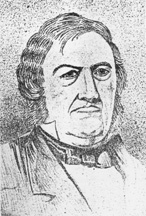Thomas Morris is a forgotten titan of Ohio politics. Serving only one term as a United States Senator from Ohio, 1833-1839, Morris left his mark on national politics because of slavery. Voted in on the coattails of the Jackson presidency, Morris stood strong with the president on the issues of the banking system and ‘nullification”. As time went on, he became an early opponent of slavery; this put him at odds with the Jacksonian Machine that got him elected as a result.
Born in Berks County, Pennsylvania, January 3, 1776, Morris was the fifth child of a Baptist minister and his wife. They soon moved to Clarksburg, Virginia, now West Virginia. Tradition holds that his anti-slavery beliefs were a result of his mother’s views. His mother, Ruth, was the daughter of a Virginia planter. Seeing the hardships of her father’s slaves had an impact on her to the point of not accepting four slaves as part of her inheritance. It should be noted, however, that she also did not free them. If indeed this was where the seeds were sown for his anti-slavery beliefs, they would not surface until his time as a United States Senator.
After a brief stint, searching for Indians in the back country, as a Wood Ranger, under the command of Captain Levi Morgan, Thomas Morris arrived at the Columbia settlement in 1795. He worked as a store clerk for several years, married Rachel Davis in 1797, then moved to Bethel, Ohio in Clermont County in 1800. He studied for and passed the bar to become a lawyer in 1804. He set up shop in Bethel and soon had a successful practice as a frontier lawyer.
Thanks to his success, he rose to prominence and was elected to the Ohio House of Representatives in 1806. He went on to serve in the Ohio Senate as well before gaining the national stage as United States Senator from Ohio 1833-1839. His selection by the Democrats for the senate seat was largely viewed as reward for his ardent support of the re-election of Andrew Jackson. Morris proved his loyalty by supporting Jackson’s war with the National Bank and introducing anti-nullification legislature that passed through the government. This may have been the high-water mark for this relationship.
As the issue of slavery raised its ugly head due to America’s expansion, legislators began to take sides based on state location and personal beliefs. On January 7, 1836, Senator Morris introduced an anti-slavery bill in the 24th Congress, which raised the ire of South Carolina’s John C. Calhoun. In response to Calhoun’s attack, Morris stood his ground and seemingly broke what was a “gentleman’s agreement” not to broach the subject at length. The gauntlet had been thrown down and Morris was now hailed a torch bearer by abolitionists such as Cincinnati’s James G. Birney. While popular in those circles, his views were not so within the party that elected him. President Andrew Jackson went so far as to “shun” him on his visit to Cincinnati. The writing was on the wall; Morris had lost the support of his party due to his outspoken views on slavery. As the Senator’s first term came to a close, he did not seek a second term in the senate.
Thomas Morris returned to Clermont County. In 1840, he began to work at the Elk Lick Mill property owned in partnership by Charles White, his son-in-law, and others. The property had a sawmill, gristmill, and distillery on site. Morris split his time between his home in Bethel and working and staying on the grounds of the Elk Lick House compound. It appears that with the exception of running for vice-president on the Liberty Party ticket in 1844, that most of Morris’ time was spent at Elk Lick Mills. So much so that three mortgages were owed to Thomas Morris’ estate after his death December 7, 1844. A rise in the value of the Elk Lick property indicates that the Elk Lick House front addition was probably built while Morris was still alive, perhaps as his retirement home. To reinforce this possibility, the census of 1850, according to researcher, Mary Laudrick, shows Charles White, Thomas Morris’ widow and three daughters all living at Elk Lick House. Regardless, Senator Morris left his mark on the anti-slavery movement, Clermont County, and Elk Lick House.

